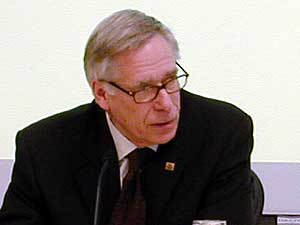Audio
Photos
Your Voice
| |||||||||||||||||||||||||||||||||||||||||||||||
U of M outlines budget-cutting strategy
March 14, 2003
University of Minnesota officials say their plan for solving a $200 million loss in state funding will include tuition increases, wage freezes and program cuts. U of M President Robert Bruininks outlined a budget strategy Friday for the Board of Regents that includes another double-digit jump in the cost of an undergraduate education.
Minneapolis, Minn. — Gov. Pawlenty's proposed state budget for for the next two years reduces funding to the University of Minnesota by 15 percent. University officials estimate the total potential loss at $211 million. U of M President Robert Bruininks is calling it the biggest financial challenge since the Great Depression. He told members of the Board of Regents that there are no simple solutions.
"If we were to try to manage this reduction in state resources ... solely by reducing the University of Minnesota's workforce, we would have to lay off 1,709 faculty and staff next year, starting July 1," Bruininks says.
Bruininks says a tuition-only approach to the problem would require a 30 percent increase. Instead, he's proposing a strategy that relies on tuition hikes for about half of the budget fix. The rest would come from a variety of cuts in academic functions and support services.
 | |||
Bruininks estimates undergraduate tuition will increase about 14.5 percent next year on the Twin Cities campus. He expects smaller increases at the system's other campuses.
"We think the coordinate campuses cannot go that high. They're going to be somewhat lower, but double-digit, or they will not be able to balance their budget and we will not be able to balance our budget," Bruininks says. "Graduate rates will probably be very close to the undergraduate rates, but maybe slightly lower. We just don't know yet."
Students leaders are concerned another double-digit tuition increase will make it harder for the University of Minnesota to compete with neighboring states. Allison Rhody, a student representative to the Board of Regents, says neighboring states are also having financial problems. But she thinks the U of M could attract students with a lower tuition increase.
"Currently it is more expensive to attend the University of Minnesota, Duluth than any of the other 13 public institutions in the region by at least $500, making it the most expensive university in the area," Rhody says. "Some Wisconsin schools, specifically UW-Superior, allow Minnesota students to pay the MnSCU equivalent tuition rate -- making it actually less expensive for in-state students to attend Wisconsin schools."
|
It is more expensive to attend the University of Minnesota, Duluth than any of the other 13 public institutions in the region by at least $500, making it the most expensive university in the area.
- Allison Rhody, student rep to the Board of Regents |
One regent is suggesting the university also look at the financial impact of accepting more students for enrollment. Frank Berman says the option should be considered even if it's the worst alternative.
"I understand that there are optimum numbers of students, but it may be a policy discussion as to whether we vary from that optimum for the next couple of years during this difficult time," says Berman.
The tuition estimate in Bruininks' plan falls within Gov. Pawlenty's budget recommendation. The governor is requesting the university limit its tuition increase to 15 percent.
The university predates Minnesota statehood and enjoys administrative autonomy. Bruininks says he doesn't want state officials trying to micro-manage the university.
"I don't personally like such recommendations -- I'll be honest about it. But they're here and we'll certainly consider them in a very respectful way," Bruininks says. "But we have to act in a way that I think is in the best interest of the University of Minnesota."
Bruininks appears willing to partially follow another of the governor's budget recommendations, a freeze on employee wages. Bruininks says there will not be any proposed salary increases for the first year of the biennium, but the second year is another matter. He says any longer freeze would be devastating to a university trying to compete for talented faculty.
|
News Headlines
|
Related Subjects
|


